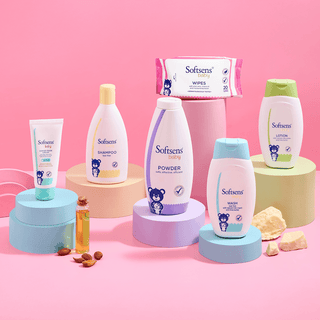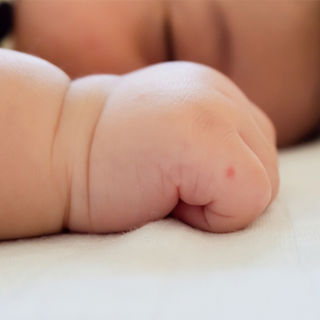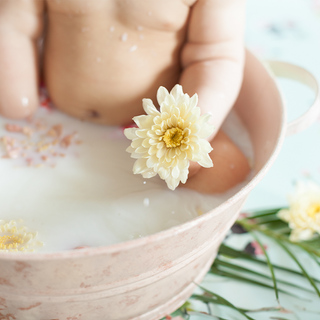The teething phase can be an uncomfortable one for your baby, leaving both parent and child quite distressed. While this phase will eventually pass, there are several ways in which you can comfort and soothe your baby during this stressful time. To help you get through this, we spoke to mom and dentist, Dr Mitali Haria Bhatia, on how you can deal with teething babies and help relieve their pain.
Meet Dr. Mitali Hari Bhatia, a practicing dentist and blogger (@drmitalihariabhatia). As an oral healthcare professional, Dr. Mitali is keen to share information and create increased awareness on the importance of maintaining good oral hygiene. Read the full interview below where she shares some of her most valuable tips.

Q. Thanks so much for sharing your expertise with us. Can you tell us a little about your toddler and when exactly he began teething?
Ans. My little boy’s name is Hriday and he is 16 months old. He began teething when he was 4 months old and his upper front teeth (known as central incisors) erupted when he was around 5 months old.
Q. How does one spot the signs of teething in toddlers, and why is it usually a painful stage for them?
Ans. There are various signs which indicate teething, such as,
Excessive drooling
Mouthing and biting more than usual
Fussier at night
Fever, rashes and diarrhea
Disturbed sleep
Rubbing of ears and cheeks
Decreased appetite
Swollen red gums
The soreness and swelling of the gums before a tooth comes through is the cause of the pain that a baby experiences during this phase.
Q. How long does the teething phase usually last?
Ans. Teething is a process which starts at around 4-5 months and lasts until all the milk teeth have erupted, which is roughly at around 25-33 months.
Q. What are some of the ways in which one can comfort a teething toddler and relieve some of their pain?
Ans. The most safe and trusted method to relieve pain is by massaging their gums.
Let them chew on a cold washcloth or cold spoon.
Give them chilled Yogurt, vegetable purees and fruits under supervision.
Breastfeeding can comfort and relieve irritation.
You can also use silicone / wooden teethers.
Drool should be cleaned as soon as possible as it may cause irritation and further lead to itching.
Q. Do you have any secret home remedies for soothing sore gums?
Ans. Breastmilk ice cubes for young babies below 6 months and fruit popsicles for toddlers relieves pain and is easily accepted by them. The cold basically numbs the area, thus giving them relief. Chamomile and rosehip herb tea brewed for around 6-7 minutes can be given in small quantities to toddlers. For younger babies, you can immerse it in a clean wash cloth and give it to them to suck on.
Q. As toddlers often lose their appetite during the teething phase, what kind of foods would you recommend during this time?
Ans. Appetite loss is basically because of the gum irritation. Foods that are easier to chew on and avoid stress on the swollen gum are usually preferred.
Soups, purees, smoothies, milkshakes, yogurt are filling and can be given if children are reluctant to eat solid or semisolids. Fed is always better. Give options to your child and see his preference. For young babies breastfeeding will become more frequent and result in cluster feeding which is perfectly okay.
Q. Do you recommend any kind of medicinal treatment for teething toddlers?
Ans. Teething is a natural process and is a phase which will soon pass. Personally, I would not recommend any medicine for the same.
Q. In what cases would you recommend that moms of teething toddlers seek help from their doctor?
Ans. Natural and home remedies are preferred as they do not have any side effects. Even after using these if the child is not soothed, I would suggest visiting your dentist soon.
Q. How do you gently care for your baby’s new teeth?
Ans. Cleaning should be started when the first tooth appears. Whether the child is being exclusively breastfed or may have started semisolids or solids, the rule is the same.
A wet washcloth/gauze piece can be used when your baby has 2 or 3 teeth. However, as the number of teeth increase, parents should switch to a silicone finger brush.
Pea-sized fluoride-free toothpaste can be used with a brush for toddlers below 3 years of age who are unable to spit out.
Pea-sized toothpaste with less amount of flouride should be used for children between 3-6 years of age.
Regular adult toothpaste can be used for children above 6 years of age under adult supervision.
Q. As a dentist, what would you say are the most important tips for maintaining your baby’s oral health?
Ans. Bacteria cannot harm the teeth before they erupt. However, we cannot predict the eruption of new teeth. Hence having a daily routine of cleaning the gum pads during bath-time using a wet washcloth will make the transition into toothbrushing easier for the child as well as the parent.Parents are the best role models. Children like to imitate their parent’s actions. Make brushing a fun activity by demonstrating to them how you do it, then assisting them and letting them practice on their own after you have cleaned their teeth.
A sticker chart for morning and night brushing can be made, a reward can be given on its completion. This activity can boost their morale.
Books regarding brushing can also be introduced.
The use of a brush with a preferred colour or character has been observed to help inculcate this good habit.
Food habits also play a major role in maintaining good oral hygiene. Sticky, refined and processed foods should be avoided. Sugar intake should be kept under check. Avoid anything sweet after 4 pm.
Brushing twice daily and rinsing of the mouth after eating should be encouraged.
A dental check-up of your child when his first tooth is advised followed by 6 monthly check ups throughout his lifetime.



















